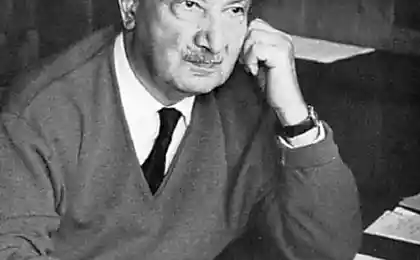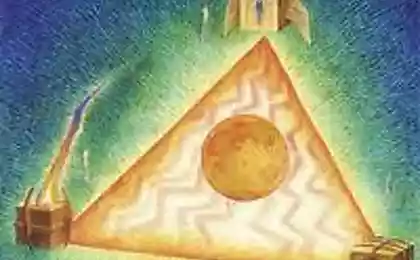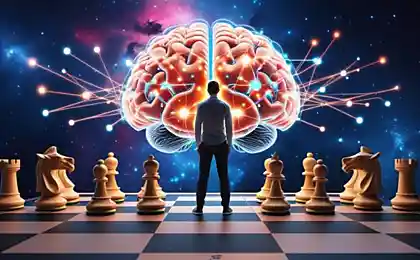264
Merab Mamardashvili: When does a man cease to be a man?
One of the greatest philosophers of the XX century Merab Mamardashvili believed that life challenges a person to be or to exist. But what is “being” and how is it different from “being”? How do Cartesian Principle, Kant Principle and Kafka Principle interact in the modern world? “Why?” or “Why?” – Which of these questions reflects the meaning of our existence? And what is the anthropological catastrophe Mamardashvili is talking about? We got it.

Merab Konstantinovich Mamardashvili
To be or not to be?
Modern Russian psychologist D. Leontiev notes that, despite the spread in philosophical and journalistic literature, this concept is almost nowhere given an exact definition. The absence of an unambiguous short definition is explained not by the complexity of the concept itself, but rather by the specificity of epistemological coordinates of the thought of Mamardashvili himself. The fact is that he clearly distinguished (and this is the classical philosophical tradition) “being” and “being”. Mamardashvili referred to the order of “being” everything that is done as if by itself, without the participation and effort of a person. “Existence” occurs when a person “thinks”, “loves”, “wants”, etc. That is, it is not he himself who thinks, loves, or wants, but something, some force outside and besides him, controls the processes of his life. By “being” Mamardashvili understood those rare acts and events that occur in life precisely by the conscious (good) will of the person himself. When man takes himself as the first cause of the whole chain of life circumstances.
Life, according to Mamardashvili, challenges a person to be or exist. Being free, a person chooses the image (way) of his life. To be (to be) means always to act on the basis of self, that is, to assume the causes of one’s actions in oneself and not outside oneself. For example, a person chooses a profession not because it is prestigious or, say, brings a lot of money, but because he chooses it as the business of his life, which requires full participation and dedication from him. In other words, it is not something external, some posul seduces a person, but he, proceeding from himself, freely chooses some activity from his being. An exemplary example of such an existential choice is the philosophizing of Socrates, for which he received no benefits and from which he did not abandon even in the face of the threat of punishment.
The difference between “existence” and “being” can be denoted by two simple questions: “Why?” and “Why?” After all, if we, for example, see a flying stone, it does not occur to us to ask “why does it fly?”, but rather to ask “why does it fly?” and answer “probably because someone threw it.” That is, there was some external, independent of the stone cause that set it in motion.The question "why?" presupposes the existence of an independent will capable of free goal-setting. With regard to some actions of some people, it is quite appropriate to ask “why does he (she/they) do this?” However, this does not mean that the question “why?” is a priori legitimate in the sphere of human life. Other people, or rather, many people in their inertial-passive existence (social vegetation) are essentially no different from a flying stone. They are also driven by some external reason, be it the desires of parents, fashion, cultural stereotypes, social obligations, etc.

Death of the subject
It is the total dominance of “existence” and the almost complete elimination of “being” in the XX century that Mamardashvili calls “an anthropological catastrophe.” The consciousness of millions of people was zombified by ideologies (in Europe – fascism, in the USSR – socialism), which deprive them of the right to independent existential self-determination. It should be noted that in the twenty-first century, the situation has not changed, if not worse. The ideology of liberalism triumphed. Its undeniable dominance is evidenced by the processes of globalization and the orientation of many countries to the Western format of consumer society.
Returning to the definition of an anthropological catastrophe, it can be said that it is synonymous with the death of a cogital Cartesian subject. In fact, Mamardashvili himself in his report “Consciousness and Civilization” directly points out that the “anthropological catastrophe” is a violation of the principle of the first “K” (Cartesia). The Cartesian Principle states that in the world some simple and immediately obvious situation takes place and happens, which can be expressed by the short formula “I am”. This proposition, by questioning everything else, not only reveals a certain dependence of everything that happens in the world on man’s own actions, but is also the starting point of absolute certainty and evidence for any conceivable knowledge. In this sense, man is a being capable of saying, “I think, I exist, I can.” Simply put, everything that should have been done by the world has already been done, it is up to you. And no counter-necessities of nature, natural forces and circumstances can deprive a person of his principled “I can”. Only he can voluntarily renounce this existential privilege, that is, become a slave (his habits, public opinion, political order, etc.).
It is important to understand that it is impossible to realize the principle of Cartesia in isolation from the principle of the second “K” (Kanta), which indicates the conditions under which a being finite in space and time (for example, a person) can meaningfully perform acts of cognition, moral action, evaluation, get satisfaction from the search, etc. Otherwise, there would be no meaning to anything – infinity ahead (and behind).In other words, this means that the conditions are realized in the world under which these acts have meaning at all, that is, it is assumed that the world could be such that they would become meaningless. The realization of moral actions, evaluations, and the seeker’s desire is meaningful only to the finite being. For an infinite and omnipotent being, questions about their meaning disappear of themselves and are thus resolved.
But even for a finite being, it is not always and not everywhere, even with appropriate words, possible to say “good” or “bad,” “beautiful” or “ugly,” “true” or “false.” For example, if one animal ate another, we cannot say with absolute certainty whether it is good or evil, just or wrong. As in the case of ritual human sacrifice. And when modern man makes use of his assessments, we must not forget that it is implicitly assumed that the conditions which give meaning in general to our claim to perform acts of knowledge, moral evaluation, etc., are fulfilled. Therefore, Kant’s principle states that it is meaningful, since there are special “intelligible objects” in the structure of the world itself that guarantee this right and meaning.
It is not difficult to recognize in the above principles the classical code of European culture, based on the fundamental freedom of the self-conscious individual; freedom, inevitably presupposing responsibility for one’s own thinking, words and actions, both to others and to oneself. This “freedom-responsibility”, in fact, is a system-forming factor of the whole body of culture (Modern) and society (civil society).“Anthropological catastrophe” in this vein can be interpreted as a transition to postmodernity, which is based on the oblivion of classical European values. Today, Descartes’ cogital subject, Kant’s transcendental subject, is replaced by Marcuse’s “one-dimensional man.”

We were born to make Kafka come true.
In the conditions of non-fulfillment of the principles of the first two “K”, the rule of the third “K” (Kafka) principle comes, when, with the same external signs and subject nominations and the observability of their natural referents (object correspondences), everything that is set by the principles of Cartesius and Kant is not fulfilled. Realization of the Kafka principle means the emergence of a “zombie situation” in which everything that happens is quite human-like, but in reality devoid of humanity (in the sense of the possibility of being a free conscious being). Baudrillard describes this situation as a separation of the signifier from the signified. The empty signifier becomes a simulacrum. A person who has lost his subjectivity (in the Cartesian sense) also becomes an empty sign, an imitation of a person.
Albert Schweitzer wrote that “modern man is almost entirely at the mercy of forces which seek to deprive him of confidence in his own thinking.” An “anthropological catastrophe” is an inability to think for oneself and all the consequences resulting from this inability. Apparently, this is the main catastrophic event of the XX century, which remains relevant today.
Therefore, Mamardashvili’s observation is correct:
When I hear of environmental disasters, possible cosmic collisions, nuclear war, radiation sickness or AIDS, all this seems to me less terrible and more distant than the things I have described, which are in fact the most terrible catastrophe, for it concerns the man on whom everything else depends.
Author: Alibek Sharipov
P.S. And remember, just changing our consumption – together we change the world!
Source: monocler.ru/antropologicheskaya-katastrofa-mamardashvili/

Merab Konstantinovich Mamardashvili
To be or not to be?
Modern Russian psychologist D. Leontiev notes that, despite the spread in philosophical and journalistic literature, this concept is almost nowhere given an exact definition. The absence of an unambiguous short definition is explained not by the complexity of the concept itself, but rather by the specificity of epistemological coordinates of the thought of Mamardashvili himself. The fact is that he clearly distinguished (and this is the classical philosophical tradition) “being” and “being”. Mamardashvili referred to the order of “being” everything that is done as if by itself, without the participation and effort of a person. “Existence” occurs when a person “thinks”, “loves”, “wants”, etc. That is, it is not he himself who thinks, loves, or wants, but something, some force outside and besides him, controls the processes of his life. By “being” Mamardashvili understood those rare acts and events that occur in life precisely by the conscious (good) will of the person himself. When man takes himself as the first cause of the whole chain of life circumstances.
Life, according to Mamardashvili, challenges a person to be or exist. Being free, a person chooses the image (way) of his life. To be (to be) means always to act on the basis of self, that is, to assume the causes of one’s actions in oneself and not outside oneself. For example, a person chooses a profession not because it is prestigious or, say, brings a lot of money, but because he chooses it as the business of his life, which requires full participation and dedication from him. In other words, it is not something external, some posul seduces a person, but he, proceeding from himself, freely chooses some activity from his being. An exemplary example of such an existential choice is the philosophizing of Socrates, for which he received no benefits and from which he did not abandon even in the face of the threat of punishment.
The difference between “existence” and “being” can be denoted by two simple questions: “Why?” and “Why?” After all, if we, for example, see a flying stone, it does not occur to us to ask “why does it fly?”, but rather to ask “why does it fly?” and answer “probably because someone threw it.” That is, there was some external, independent of the stone cause that set it in motion.The question "why?" presupposes the existence of an independent will capable of free goal-setting. With regard to some actions of some people, it is quite appropriate to ask “why does he (she/they) do this?” However, this does not mean that the question “why?” is a priori legitimate in the sphere of human life. Other people, or rather, many people in their inertial-passive existence (social vegetation) are essentially no different from a flying stone. They are also driven by some external reason, be it the desires of parents, fashion, cultural stereotypes, social obligations, etc.

Death of the subject
It is the total dominance of “existence” and the almost complete elimination of “being” in the XX century that Mamardashvili calls “an anthropological catastrophe.” The consciousness of millions of people was zombified by ideologies (in Europe – fascism, in the USSR – socialism), which deprive them of the right to independent existential self-determination. It should be noted that in the twenty-first century, the situation has not changed, if not worse. The ideology of liberalism triumphed. Its undeniable dominance is evidenced by the processes of globalization and the orientation of many countries to the Western format of consumer society.
Returning to the definition of an anthropological catastrophe, it can be said that it is synonymous with the death of a cogital Cartesian subject. In fact, Mamardashvili himself in his report “Consciousness and Civilization” directly points out that the “anthropological catastrophe” is a violation of the principle of the first “K” (Cartesia). The Cartesian Principle states that in the world some simple and immediately obvious situation takes place and happens, which can be expressed by the short formula “I am”. This proposition, by questioning everything else, not only reveals a certain dependence of everything that happens in the world on man’s own actions, but is also the starting point of absolute certainty and evidence for any conceivable knowledge. In this sense, man is a being capable of saying, “I think, I exist, I can.” Simply put, everything that should have been done by the world has already been done, it is up to you. And no counter-necessities of nature, natural forces and circumstances can deprive a person of his principled “I can”. Only he can voluntarily renounce this existential privilege, that is, become a slave (his habits, public opinion, political order, etc.).
It is important to understand that it is impossible to realize the principle of Cartesia in isolation from the principle of the second “K” (Kanta), which indicates the conditions under which a being finite in space and time (for example, a person) can meaningfully perform acts of cognition, moral action, evaluation, get satisfaction from the search, etc. Otherwise, there would be no meaning to anything – infinity ahead (and behind).In other words, this means that the conditions are realized in the world under which these acts have meaning at all, that is, it is assumed that the world could be such that they would become meaningless. The realization of moral actions, evaluations, and the seeker’s desire is meaningful only to the finite being. For an infinite and omnipotent being, questions about their meaning disappear of themselves and are thus resolved.
But even for a finite being, it is not always and not everywhere, even with appropriate words, possible to say “good” or “bad,” “beautiful” or “ugly,” “true” or “false.” For example, if one animal ate another, we cannot say with absolute certainty whether it is good or evil, just or wrong. As in the case of ritual human sacrifice. And when modern man makes use of his assessments, we must not forget that it is implicitly assumed that the conditions which give meaning in general to our claim to perform acts of knowledge, moral evaluation, etc., are fulfilled. Therefore, Kant’s principle states that it is meaningful, since there are special “intelligible objects” in the structure of the world itself that guarantee this right and meaning.
It is not difficult to recognize in the above principles the classical code of European culture, based on the fundamental freedom of the self-conscious individual; freedom, inevitably presupposing responsibility for one’s own thinking, words and actions, both to others and to oneself. This “freedom-responsibility”, in fact, is a system-forming factor of the whole body of culture (Modern) and society (civil society).“Anthropological catastrophe” in this vein can be interpreted as a transition to postmodernity, which is based on the oblivion of classical European values. Today, Descartes’ cogital subject, Kant’s transcendental subject, is replaced by Marcuse’s “one-dimensional man.”

We were born to make Kafka come true.
In the conditions of non-fulfillment of the principles of the first two “K”, the rule of the third “K” (Kafka) principle comes, when, with the same external signs and subject nominations and the observability of their natural referents (object correspondences), everything that is set by the principles of Cartesius and Kant is not fulfilled. Realization of the Kafka principle means the emergence of a “zombie situation” in which everything that happens is quite human-like, but in reality devoid of humanity (in the sense of the possibility of being a free conscious being). Baudrillard describes this situation as a separation of the signifier from the signified. The empty signifier becomes a simulacrum. A person who has lost his subjectivity (in the Cartesian sense) also becomes an empty sign, an imitation of a person.
Albert Schweitzer wrote that “modern man is almost entirely at the mercy of forces which seek to deprive him of confidence in his own thinking.” An “anthropological catastrophe” is an inability to think for oneself and all the consequences resulting from this inability. Apparently, this is the main catastrophic event of the XX century, which remains relevant today.
Therefore, Mamardashvili’s observation is correct:
When I hear of environmental disasters, possible cosmic collisions, nuclear war, radiation sickness or AIDS, all this seems to me less terrible and more distant than the things I have described, which are in fact the most terrible catastrophe, for it concerns the man on whom everything else depends.
Author: Alibek Sharipov
P.S. And remember, just changing our consumption – together we change the world!
Source: monocler.ru/antropologicheskaya-katastrofa-mamardashvili/























